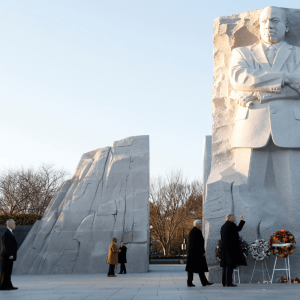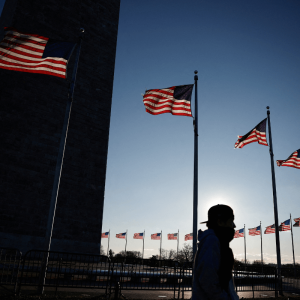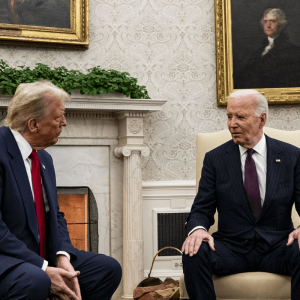
Rev. Adam Russell Taylor is president of Sojourners and author of A More Perfect Union: A New Vision for Building the Beloved Community. Follow him on X @revadamtaylor.
Taylor previously led the Faith Initiative at the World Bank Group and served as the vice president in charge of Advocacy at World Vision U.S. and the senior political director at Sojourners. He has also served as the executive director of Global Justice, an organization that educates and mobilizes students around global human rights and economic justice. He was selected for the 2009/2010 class of White House Fellows and served in the White House Office of Cabinet Affairs and Public Engagement. Taylor is a graduate of Emory University, the Harvard University Kennedy School of Government, and the Samuel DeWitt Proctor School of Theology. Taylor also serves on the Independent Sector Board, the Global Advisory Board of Tearfund UK, and is a member of the inaugural class of the Aspen Institute Civil Society Fellowship. Taylor is ordained in the American Baptist Church and the Progressive National Baptist Convention and serves in ministry at the Alfred Street Baptist Church in Alexandria, Va.
Speaking Topics
- Human rights and global poverty
- Racial justice
- Voting rights
- Climate justice
- Economic justice
- Immigration
- Peace and nonviolence
- His most recent book, A More Perfect Union: A New Vision for Building the Beloved Community
Speaking Format
- Virtual and in-person events, also available for preaching
Languages
- Fluent in English
Past Notable Events
- Tufts University’s Russell Lecture
- United Church of Christ General Synod Gathering Keynote
- Children’s Defense Fund Staff Retreat Keynote
- Parliament of the World Religions
- Christian Community Development Association Keynote Panel
Posts By This Author
The Real Victims of Trump's Trade Debacle Rarely Make Headlines
In these tumultuous moments, I’m tempted to worry about my own retirement savings — a threat that is especially acute for those nearing retirement. These are real fears. Yet, as Christians, we also must pay attention to those who will feel the most severe impacts of this economic malpractice. And the sad truth is that these reckless tariffs will be especially harmful for people who don’t even have a 401(k), let alone any way to seek redress for U.S. government policies likely to increase inflation and spark a recession.
I Underestimated the Religious Right
When I reread the prologue of my 2021 book, A More Perfect Union, I’m reminded just how badly so many of us underestimated the backlash that followed the racial awakening of 2020 — and how durable the forces of grievance, fear, and economic dislocation have become. I wrote about my hope that Trump’s Big Lie and his corresponding efforts to overturn the 2020 election results would serve as a wake-up call to protect and strengthen our democracy. Yet that lie only got worse and our urgent calls to save our democracy failed to break through. I hoped that lessons from the pandemic would inspire a greater commitment to build a more equitable economy, yet the backlash against shutdowns and vaccines seemingly exacerbated our culture wars and individualism.
Jubilee Isn’t Just for Catholics
EVERY 25 YEARS the global Catholic Church celebrates a Jubilee — and this is one of those years. Jubilee years are rooted in the biblical tradition from Leviticus, in which God mandates that slaves and prisoners be freed, debts forgiven, the land and creatures given rest, and relationships with our neighbors and with God set right. Pope Francis’ chosen theme for 2025 is “Pilgrims of Hope.” What does this mean for all of us, Catholic or not, who stand in the biblical tradition? Many of us, myself included,feel anxiety about what the next four years will bring. President Trump’s rhetoric and policies will likely result in attacks on immigrants, restrictions on LGBTQ+ people, heightened racial tensions, increased economic chaos, and dismantling advances in slowing climate change. Not just Americans are anxious. These actions impact people around the world.
Trump's Attack on USAID Is Evil
With Trump’s blessing, Elon Musk’s Department of Government Efficiency has created an unprecedented crisis at an agency that oversees lifesaving assistance to some of the poorest and most vulnerable people in the world. Despite issuing limited humanitarian waivers, the administration has frozen nearly all new foreign assistance funding for the next 90 days, fired many senior leaders, and put the entire agency’s staff of more than 10,000 people on leave, two-thirds of whom work in field locations around the world.
Trump Wants Us to Feel Powerless. Don't Let Him
Trump's barrage of executive orders, policy decisions and campaign appointments is overwhelming in its extremism. It is designed to provoke a feeling of panicked helplessness among those who oppose his plans for immigrants, LGBTQ+ people, and other targets of his vision for our country. But we do not have to give Trump what he wants and, by staying rooted in our faith, can undermine his campaign of shock and awe.
MLK's Dream Is Trump's Nightmare
The juxtaposition is hard to ignore: President-elect Donald Trump, who launched his political career by questioning — without evidence — the citizenship of our country’s first Black president, will take his second oath of office on the day we remember and honor Rev. Martin Luther King Jr., this country’s greatest champion for civil and human rights. Though I hope and pray Trump’s second term will follow the moral vision we honor every year on King’s birthday, I fear the dream King cast for America is much more akin to Trump’s nightmare.
Jimmy Carter Applied His Faith to the Messiness of Politics. We Should Too
Since his death, Carter’s remarkable life and numerous accomplishments have been rightly celebrated, including the Camp David Accords, a historic nuclear weapons treaty, major environmental protection legislation, the release of political prisoners, the near-eradication of the Guinea worm, aid in conducting free and fair elections in dozens of countries around the world, and decades of volunteer service with Habitat for Humanity. But despite this impressive legacy, what most inspires me about Carter was how he applied his faith to the messiness of politics, both during his time in the White House and in his many years after — a model that we desperately need today in our increasingly polarized and vitriolic politics.
Preparing for the Coming King (No, I Don’t Mean Trump)
I want to draw a careful distinction between saying that God can use an earthly event like an election to accomplish God’s purposes in the world and the claim that God — not the majority of American citizens who voted in the election this past November — chose Trump to become president.
Feeling Anxious About Trump's Nominees? Here's What To Do
Friends and colleagues have mentioned how the news alert ping of each new nomination can often leave them feeling frozen with dread or just wanting to unplug from the news altogether. I can relate. But I want to offer a better way forward that’s rooted in my values as a Christian — a way to engage that doesn’t leave me feeling trapped in anxiety or resignation.
My Soul Needed a Spiritual Reset
SOLITUDE OFTEN CAN be dismissed as a spiritual luxury or afterthought. But as I’ve grown in ministry and activism, I have become convinced that solitude is a spiritual necessity.
I found myself spiritually depleted this past summer, carrying the weight of dismay and uncertainty associated with the election, anxiety and stress tied to the responsibilities of leading Sojourners in this season, and so much more. I debated whether to take some of my sabbatical. (Sojourners employees receive a one-month sabbatical after every seven years of employment.) My soul desperately needed it, but I kept pushing it off due to the tyranny of the urgent. I finally committed to a plan for August.
I’m beyond grateful for a vacation with my family, followed by a five-day silent retreat at Prince of Peace Abbey, a Benedictine monastery north of San Diego. My soul needed this spiritual reset.
The Road Ahead Will Test Us. We Start By Accepting Trump’s Win
As a person of faith, I am deeply concerned about what the outcome of this election means, especially for those who will be most vulnerable to threats of mass deportations, retaliation against perceived political enemies, and other actions planned by the incoming administration. Yet we must not follow the example set by the president-elect and his followers: We can and should acknowledge the recent election results as legitimate, even if we are pained by them. I am hopeful that we can use this moment to break the fever of election denialism and rebuild trust in our election system — a shift that will be critical for future elections. Equally critical will be our commitment to advance justice and peace, a commitment that requires us to roundly reject the siren songs of violence, conspiracy theory, and anti-democratic methods.
Surrendering Our Soul-Wrenching Emotions to God Is an Act of Faith
I’ll admit I struggle to face the reality that many in our country — roughly 51 percent of the popular vote, according to current estimates — are feeling some combination of elation, pride, and excitement that their chosen candidate has won. Even in my pain and grief, I know that as a follower of Jesus, I am called to pray for the incoming Trump administration and the people who voted for it. I’m committed to doing that work, but I confess: It feels hard right now.
Christian Faith Requires Us To Speak Out Against Fascist Rhetoric
“Fascist” isn’t a word I ever use lightly. It’s not a word that resonates with most Americans, and I’ve worried using that word will only further polarize our deeply divided nation. But Trump’s escalating rhetoric, especially over the past few months, calls for moral clarity: It is time to state emphatically that Trump’s rhetoric is increasingly and dangerously fascist. Since we know that this kind of language creates a permission structure to justify and incite violence, Christians of all stripes must condemn language that crosses that line.
Evangelism Without Justice Ignores the Words of Jesus
Last week, as I attended the fourth Lausanne Congress in Incheon, South Korea, I was struck with how much the global evangelical movement has evolved in the past half century, including the advent of new technologies and the explosive growth of Christianity in the Global South, which has reversed the mission field and shifted the epicenter of Christianity increasingly to Africa, Asia, and Latin America. I was also reminded how much global evangelicalism remains stymied by old debates, including overly narrow conceptions of evangelism. The reputation and witness of the church itself plays a major role in evangelism. Doing justice is integral to the cause of evangelization — a conviction and commitment I wish Christians and churches in the U.S. and around the world more strongly embraced.
Winning Debates Is Subjective. Winning Elections Shouldn't Be
But while assessing who wins a debate can be fairly subjective, determining who wins the upcoming election can’t — or shouldn’t be. As we’ve learned since 2020, confidence in our electoral system has increasingly become a partisan issue, with over 70 percent of Republican voters believing that President Joe Biden’s win in 2020 was illegitimate, a belief fueled by the pernicious, big lie that the election was stolen due to widespread voter fraud. Changing these numbers and restoring bipartisan confidence in our electoral system will require real work — and leadership from our elected officials.
The U.S. Isn't a ‘Chosen Nation.’ But Christians Can Still Be Patriotic
Christian engagement in American patriotism has often gotten a bad rap, and rightly so: All too often, a healthy love for one’s country (patriotism) seeps into a pernicious love of blood and soil (nationalism), with the latter often marked by a sense of superiority, domination, or ethnocentrism. But instead of offering a strong counter-witness to these toxic impulses, Christians in the U.S. have often led the way, twisting the gospel to support American nationalism. Understandably, some Christians — both now and in the past — have responded by rejecting nationalistic forms of patriotism as something incompatible with following Jesus. As a Christian, I believe the answer isn’t to altogether reject patriotism, but instead to redeem it.
Demonizing Christian Nationalists Won’t End It
COUNTERACTING CHRISTIAN NATIONALISM can feel like political shadowboxing: The thing you are trying to push back against feels elusive, moving like a butterfly but stinging like a bee. It’s somehow both everywhere and staying under cover. With rare exceptions, such as Rep. Marjorie Taylor Greene and Sen. Josh Hawley, few politicians or even Christian leaders self-identify as Christian nationalists. Far-Right Christian leaders such as Tony Perkins have even argued that Christian nationalism is an invention by the Left and academics to marginalize Christian conservatives. But we can’t be fooled. The peril that Christian nationalism poses to our Christian witness and faith and to our democracy is real.
One challenge in confronting Christian nationalism is succinctly defining it. Sociologists Samuel L. Perry and Philip S. Gorski talk about it as “a constellation of beliefs” — such as that the founding of the United States was “divinely inspired” — that are connected to political goals. Another challenge is that Christian nationalism exists on a spectrum, from the quiet but insidious kind that has seeped into many of our churches to the louder, more overt forms we saw on January 6. It has been present in groups throughout our history, from the Ku Klux Klan to the Religious Right to a powerful constituency now helping fuel the MAGA movement. It can be an ideology that asserts that a specific ethno-nationalist brand of Christianity, intertwined with white supremacy, patriarchy, and xenophobia, is the one true faith. And it is a strategy being harnessed to build political power and undermine our democracy. Project 2025, made in collaboration with more than 100 Far-Right organizations, provides a chilling policy and governing blueprint that embraces many tenets of Christian nationalism and would push our nation toward autocracy. We need a variety of approaches to address this continuum.
How Does Project 2025 Compare to the Beloved Community?
First unveiled in April 2023, and endorsed by more than 100 conservative organizations, Project 2025 is a 922-page document that serves as a to-do list for the next conservative president to accomplish. Activists, journalists, and many religious leaders have been warning the public for months about what they see as some of Project 2025’s more extreme policy proposals and the ways in which the blueprint would push our nation toward autocracy and Christian nationalism.
After Political Violence, How Do We Love Our Enemies?
Many of us are feeling fear, disorientation, or anger at this moment. As Christians, we need to meet perilous feelings with a resolve to follow Jesus and remember his teachings: The truth will set us free, and we must learn to love our enemies.
10 Gospel Songs That Sustain Me in Troubling Times
Gospel music is my oasis in troubled times. My colleagues can also attest that it’s the background music by which I conduct most of my work.



















